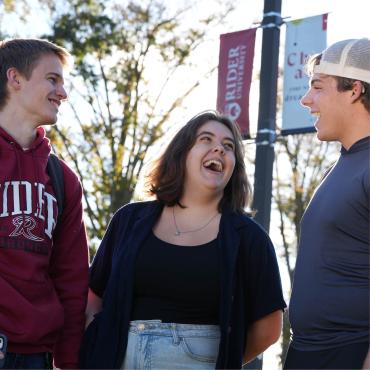As an academic community, Rider University is committed to providing an environment in which living and learning can occur. An academic community in which students, faculty administrators, and staff come together in voluntary association differs from other communities. In order to function effectively and to provide a climate in which all members can fulfill their personal and community obligations, guidelines for defining rights and responsibilities within that community must be articulated.
The code that follows attempts to do that by allowing each student the greatest possible freedom consistent with the community’s welfare. Violations of the standards of social conduct as defined in these regulations will be adjudicated by the appropriate hearing authority. Enforcement of the Code of Conduct is overseen by the Office of Community Standards, located in the Bart Luedeke Center, Student Affairs Suite, 609-896-5292.

Student Code of Social Conduct
View or download a pdf copy of the Student Code of Social Conduct here.
Jurisdiction of the Student Code of Social Conduct
The Student Code of Conduct may apply to any student conduct that occurs on University premises and at University sponsored activities, and also off-campus conduct that adversely affects the University Community or the pursuit of its objectives, including, but not limited to, any off-campus conduct that constitutes a violation of any law or municipal ordinance or any off-campus conduct that poses a threat to the health, safety or welfare of any members of the University Community or any residents of the neighboring communities.
Each student shall be responsible for his or her conduct from the time of acceptance for admission through the actual awarding of a degree, even though conduct may occur before classes begin or after classes end, as well as during the academic year and during periods between terms of actual enrollment (and even if the conduct is not discovered until after a degree is awarded).
The Student Code of Conduct shall apply to a student’s conduct even if the student withdraws from school while a disciplinary matter is pending. The Director shall decide whether the Student Code of Conduct shall be applied to conduct off campus, on a case by case basis, in his or her sole discretion on behalf of the University.
Definitions
- “College Official” – see definition for “University/College Personnel”
- “Hearing Authority” – refers to the person or group of persons that determines an accused student’s responsibility and, if necessary, consequences to be imposed. In matters where a student is facing temporary dismissal or expulsion from the University as a consequence, the hearing authority shall be a panel of Community Standards Board members. In other matters, the hearing authority may be the community standards administrator or a residence director.
- “Community Standards Administrator” – refers to the administrator or his/her designee appointed on either campus to determine what sections of the code of conduct may have been violated, as well as the level of responsibility at which to charge the student. The community standards administrator may also coordinate the training and activities of the standards board.
- “Community Standards Board” – Refers to the trained members of the University community who may sit as panels of three (typically two student members and one administrator member) to hear matters concerning violations of the Code of Conduct. Members of the standards board are also trained to serve as advisors to students who are charged with violating the code.
- “Student” – includes all persons taking courses at the University, both full-time and part-time, in undergraduate and graduate programs whose conduct is being adjudicated through the campus community standards system. “Student” also includes recognized student organizations.
- “University” – refers to Rider University, Lawrenceville, N.J.
- “University/College Personnel” – refers to any person employed by Rider University including, but not limited to, faculty members, administrators, staff, Public Safety officers, student workers, residence life staff.
- “University Representative” – refers to the staff person, usually the community standards administrator, who brings the charges to a standards board panel and presents the evidence and witnesses to that same panel on behalf of the University in order to show the accused student’s responsibility in the matter.
